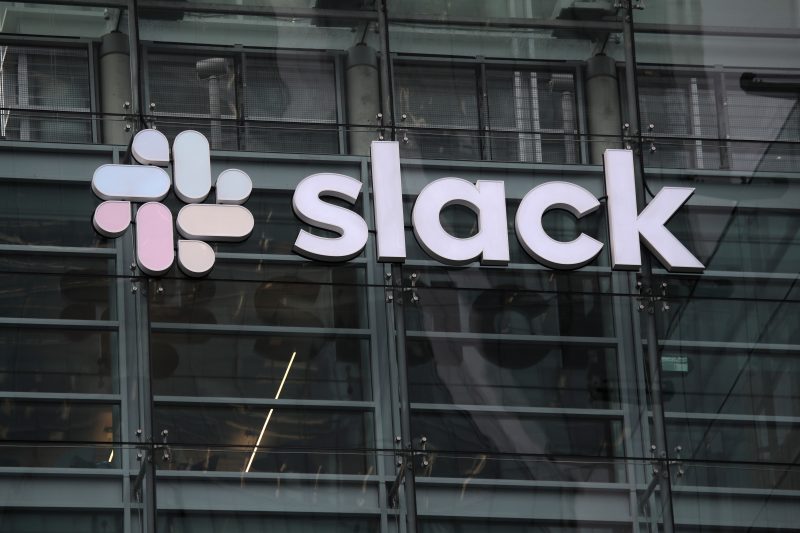Slack Technologies rises in Wall Street debut
Shares of Slack jumped after the company made its debut on the New York Stock Exchange through a direct listing (JUSTIN SULLIVAN)
New York (AFP) – Software company Slack Technologies climbed on the New York Stock Exchange Thursday after entering in a direct listing in the latest sign of Wall Street’s appetite for new technology entrants.
Shares of the company, whose arrival was marked with a giant purple banner outside the NYSE, initially surged as high as $42 but were at $40.75 near 1635 GMT. The exchange had set a reference price of $26.
The company is expected to have a market capitalization above $20 billion, and will trade under the ticker “WORK.”
“We just see an enormous opportunity,” chief executive co-founder Stewart Butterfield told CNBC Thursday shortly before ringing the opening bell of the NYSE.
Slack — the happy byproduct of a failed video-game initiative by Butterfield and colleagues — is not raising capital with the issuance. But Butterfield said that entering public markets positions the company to raise funds for growth programs down the road.
Known for its workplace messaging and information sharing program, Slack joins the growing class of 2019 as far as prominent companies going public, a group that already includes Uber, Levi’s and Beyond Meat.
Yet Slack’s decision to forgo an initial public offering distinguishes it from the crowd and could be a precursor of more such issues, according to some experts.
– Emerging trend? –
The direct listing approach, which was also employed by Spotify last year, cuts down on fees to investment bankers in IPOs. Although existing shares are sold, a direct listing does not issue new shares, averting share dilution but also forgoing the new funds raised in an IPO.
The process can also be riskier in terms of share price volatility compared with an IPO, where underwriters line up investors in advance. In a direct listing, shares are exposed more directly to the open market.
“I think you’ll see this as a trend going forward,” Robert Greifeld, the former chair of Nasdaq and now at Virtu Financial, told CNBC.
Greifeld said a direct listing leads to a “more democratic” price discovery process made by individual investors, rather than through a traditional roadshow with institutional investors.
The effect is to separate the price discovery function inherent going public from the fundraising aspect that is frequently a driver for companies, Greifeld said.
Slack has described its mission as replacing email in a company, allowing work teams to share information through work projects that can be organized in channels that consist of files, photos and employee chats.
Butterfield, who cited Latin America and Southeast Asia as strong markets for potential long-term growth, told CNBC that Slack was born from software devised to help him build a video-game with colleagues at different locations.
While the video-game did not succeed, “at one point we realized we will never work without a system like this again, the rest of the world could probably use this,” he said.
Several prominent companies that have gone public so far this year have risen since their entry, including jeans company Levi’s, Tradeweb Markets, which builds electronic marketplaces, Zoom Video Communications, and mobile application and software system Pinterest.
But the list also includes some disappointments, especially Uber and Lyft, both of which currently trade below their IPO price.
Analysts also question whether the valuation of some companies has become excessive, as in the case of food company Beyond Meat, which currently trades at more than six-fold its entering price.
jmb/jm
Disclaimer: Validity of the above story is for 7 Days from original date of publishing. Source: AFP.


